有关身体器官的英语习语
- 格式:doc
- 大小:46.50 KB
- 文档页数:6
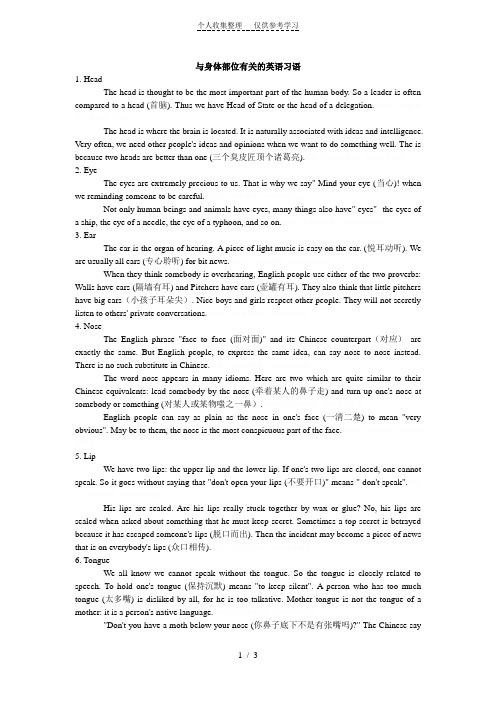
与身体部位有关的英语习语1. HeadThe head is thought to be the most important part of the human body. So a leader is often compared to a head (首脑). Thus we have Head of State or the head of a delegation.The head is where the brain is located. It is naturally associated with ideas and intelligence. Very often, we need other people's ideas and opinions when we want to do something well. The is because two heads are better than one (三个臭皮匠顶个诸葛亮).2. EyeThe eyes are extremely precious to us. That is why we say" Mind your eye (当心)! when we reminding someone to be careful.Not only human beings and animals have eyes, many things also have" eyes"- the eyes ofa ship, the eye of a needle, the eye of a typhoon, and so on.3. EarThe ear is the organ of hearing. A piece of light music is easy on the ear. (悦耳动听). We are usually all ears (专心聆听) for bit news.When they think somebody is overhearing, English people use either of the two proverbs: Walls have ears (隔墙有耳) and Pitchers have ears (壶罐有耳). They also think that little pitchers have big ears(小孩子耳朵尖). Nice boys and girls respect other people. They will not secretly listen to others' private conversations.4. NoseThe English phrase "face to face (面对面)" and its Chinese counterpart(对应)are exactly the same. But English people, to express the same idea, can say nose to nose instead. There is no such substitute in Chinese.The word nose appears in many idioms. Here are two which are quite similar to their Chinese equivalents: lead somebody by the nose (牵着某人的鼻子走) and turn up one's nose at somebody or something (对某人或某物嗤之一鼻).English people can say as plain as the nose in one's face (一清二楚) to mean "very obvious". May be to them, the nose is the most conspicuous part of the face.5. LipWe have two lips: the upper lip and the lower lip. If one's two lips are closed, one cannot speak. So it goes without saying that "don't open your lips (不要开口)" means " don't speak".His lips are sealed. Are his lips really stuck together by wax or glue? No, his lips are sealed when asked about something that he must keep secret. Sometimes a top secret is betrayed because it has escaped someone's lips (脱口而出). Then the incident may become a piece of news that is on everybody's lips (众口相传).6. TongueWe all know we cannot speak without the tongue. So the tongue is closely related to speech. To hold one's tongue (保持沉默) means "to keep silent". A person who has too much tongue (太多嘴) is disliked by all, for he is too talkative. Mother tongue is not the tongue of a mother: it is a person's native language."Don't you have a moth below your nose (你鼻子底下不是有张嘴吗)?" The Chinese sayso to blame a person who did not say what he should have said. But this not the right way to express the idea in English. English people would say, "You have a tongue in your head, haven't you?"7. FaceFace has to do with the idea of respect and dignity both in Chinese and English. You lose your face (丢面子) if you fail again and again, but a decisive victory will save your face (挽回面子) after all your failures.When you feel unhappy, you pull a long face (拉长脸). The idea is conveyed in Chinese in the same way. But "about face (向后转)" does not refer to the face. It is a military order to turn round and face in the opposite direction. It is the exact equivalent of " about turn".8. ShoulderThe shoulders can bear heavy things. Your father has a great responsibility for the family on his shoulder. When faced with difficulty, the family should stand shoulder to shoulder (肩并肩) to overcome it. You should not turn a cold shoulder (不理睬) to your family members. Nor should you give your friends the cold shoulder (冷落朋友). Both expressions mean treating others coldly.9. BackA good host is hospitable to his guests. But, if guest is tiresome, the host is glad to see his back (他离开).If your friend has done something really well, you may give him a pat on the back (轻轻拍背部) to show your appreciation.If you turn your back on somebody (不理睬他人), you mean you do not like making friends with that person.10. HeartThe heart is an extremely important organ inside the chest. It usually stands for something important or the centre of something, for example, the heart of the matter (问题的核心) or the heart of mystery.Many other expressions make use of the word heart. A lover can be called a sweet heart (情人). The Purple Heart (紫心徽章) is a medal given as an honor to American soldiers wounded in battle.If your friend is in trouble, you may encourage him by saying "Don't lose heart (不要灰心)."11. StomachThe stomach is naturally related to one's appetite. If you dislike heavy food, you have no stomach for it (反胃). The word is also related to one's interests or likings. If you find something boring or vulgar, you have no stomach for it, either. Bad food turns your stomach. Similarly, your stomach turns at a bad joke.Stomach can also be a verb. Look at this example: "How could you stomach (忍受) such rude words?" Apparently, stomach here can be replaced by "tolerate".12. ArmEvery person has two arms: the right arm and the left arm. The right arm is usually stronger, so we call a good helper the right arm (得力助手).We all know an arm is not very long. But when you keep someone at arm's length (保持距离), the distance is long enough. For that means you don not like that person and you try your best to avoid him or her. We should indeed keep the bad friends at arm's length.13. HandQuite a number of phrases formed form the word hand are very similar to their Chinese counterparts. Here are some obvious examples: a fresh hand (新手), short of hands (人手短缺), hand in hand (手拉手) and wash one's hands of something (洗手不干了). But do not always take this for granted. Study these examples and you will understand.He lives from hand to mouth (He has just enough money to live on). We gave them a big hand (We gave them lots of applause).14. FingerHow many fingers does each of your hands have? Now let's name them in English from the smallest: the little finger, the ring finger, the middle finger, the index finger and thumb.Each finger has its own part to play. If your fingers are all thumbs (笨拙), that is too bad. That means you are very clumsy.15. ThumbChinese people turn up their thumbs to express appreciation. English people do so to express not only appreciation but also approval. Chinese people never turn their thumbs down to mean anything. But English people do. They do so to show depreciation disapproval. Thus in English you can say, "We turn thumbs up (赞成) to Jack's suggestion but they turn thumbs down (不赞成) to it."Similarly, you can warmly praise someone by saying "Thumbs up (真棒)!" and show your dissatisfaction by saying "Thumbs down (差劲)!"16. SkinMost people will only think of the hair on our head when the word hair is mentioned. In fact, some animals and plants also have hair.A horrible scene may make a person's hair stand on end (毛骨悚然). But a courageous person will not turn a hair (不畏惧) even though he is in face of danger.Sometimes, a friend of yours may be so angry that he may act foolishly. Then you had better give him this advice: "Keep your hair on (别发脾气)".Selected from the book The Human Body by Huang Juanhua。
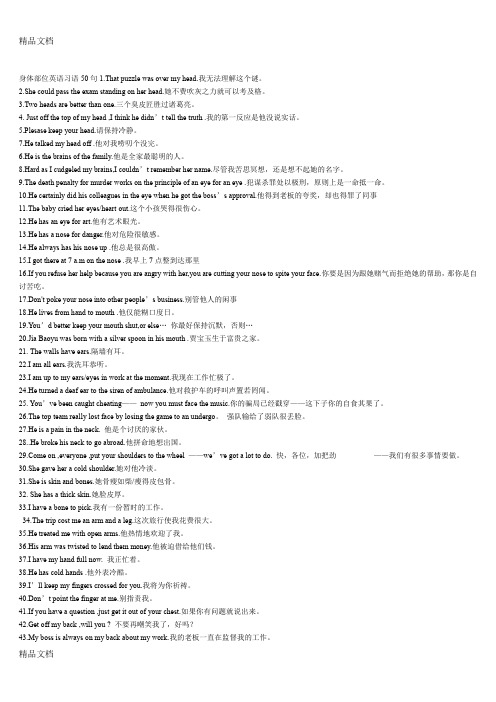
身体部位英语习语50句1.That puzzle was over my head.我无法理解这个谜。
2.She could pass the exam standing on her head.她不费吹灰之力就可以考及格。
3.Two heads are better than one.三个臭皮匠胜过诸葛亮。
4. Just off the top of my head ,I think he didn’t tell the truth .我的第一反应是他没说实话。
5.Plesase keep your head.请保持冷静。
7.He talked my head off .他对我唠叨个没完。
6.He is the brains of the family.他是全家最聪明的人。
8.Hard as I cudgeled my brains,I couldn’t remember her name.尽管我苦思冥想,还是想不起她的名字。
9.The death penalty for murder works on the principle of an eye for an eye .犯谋杀罪处以极刑,原则上是一命抵一命。
10.He certainly did his colleagues in the eye when he got the boss’s approval.他得到老板的夸奖,却也得罪了同事11.The baby cried her eyes/heart out.这个小孩哭得很伤心。
12.He has an eye for art.他有艺术眼光。
13.He has a nose for danger.他对危险很敏感。
14.He always has his nose up .他总是很高傲。
15.I got there at 7 a.m on the nose .我早上7点整到达那里16.If you refuse her help because you are angry with her,you are cutting your nose to spite your face.你要是因为跟她赌气而拒绝她的帮助,那你是自讨苦吃。
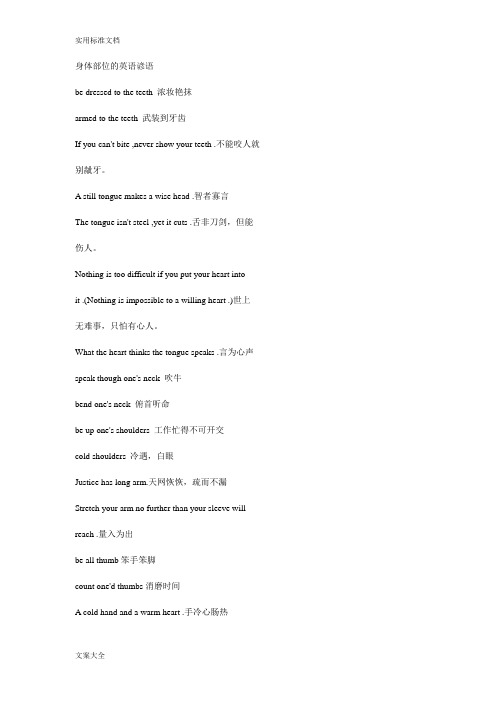
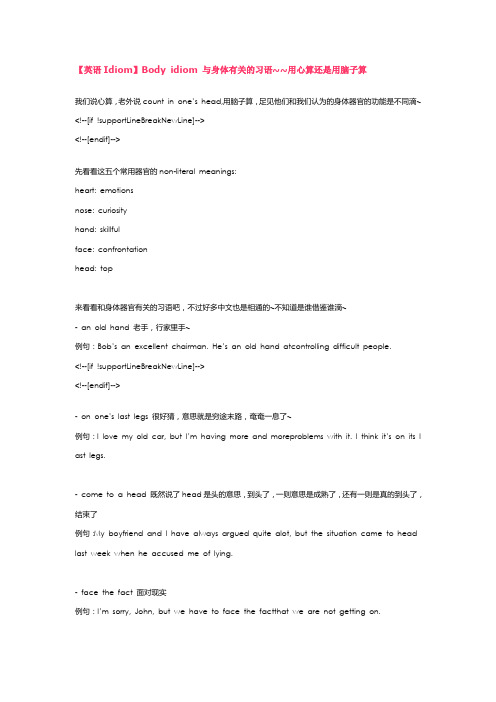
【英语Idiom】Body idiom 与身体有关的习语~~用心算还是用脑子算我们说心算,老外说count in one’s head,用脑子算,足见他们和我们认为的身体器官的功能是不同滴~ <!--[if !supportLineBreakNewLine]--><!--[endif]-->先看看这五个常用器官的non-literal meanings:heart: emotionsnose: curiosityhand: skillfulface: confrontationhead: top来看看和身体器官有关的习语吧,不过好多中文也是相通的~不知道是谁借鉴谁滴~- an old hand 老手,行家里手~例句:Bob’s an excellent chairman. He’s an old hand atcontrolling difficult people.<!--[if !supportLineBreakNewLine]--><!--[endif]-->- on one’s last legs 很好猜,意思就是穷途末路,奄奄一息了~例句:I love my old car, but I’m having more and moreproblems with it. I think it’s on its l ast legs.- come to a head 既然说了head是头的意思,到头了,一则意思是成熟了,还有一则是真的到头了,结束了例句:My boyfriend and I have always argued quite alot, but the situation came to head last week when he accused me of lying.- face the fact 面对现实例句:I’m sorry, John, but we have to face the factthat we are not getting on.- go to your head 冲昏了头脑例句:What’s the matter with you? You’ve changed sinceyour promotion. I think power’s gone to your head.- tie one’s hands 把某人的手绑起来,自然就是束手束脚的意思啦~例句:There’s nothing I can do to help, I’m afraid myhands are tied.- have/get a good head 中文里也说有头脑的,聪明的例句:Ask Marianne to help you. She’s got a good headfor figures.- put on a brave face 装作若无其事例句:I know Jane’s in a lot of pain, but she puts abrave face on it.- bury one’s head in sand 自己把头埋到了沙子里,这个就是鸵鸟的行为,就是自欺欺人~例句:We’ll have to go to the bank and ask for anotherloan. You just can’t go on buryin g your head in the sand any longer.- a pain in the neck 这个可不光是脖子的意思,这个意思是这件事是个痛苦的事例句:- Do you get phone calls from companies trying tosell you things.- All the time. They’re a pain inthe neck.- get if off one’s chest 把某物从胸膛里除去~转义就是一吐为快~例句:- I’m really worried about my economics course. Idon’t know what to do.- Do you want to talk about it? Itmight help to get it off your chest.- shoulder the responsibility 担起责任,中文也是用肩担起责任例句:She has to shoulder a lot of responsibilities.- elbow one’s way 用胳膊肘开道,肯定是需要挤来挤去往前走~这样前进的道路是痛苦的,要付出代价的例句:I don’t want to elbow my way to the top like youdid and lost all my friends on the way.- be nosey 刚说了nose在英语中表示的是curiosity, 所以be nosey就是好追问的,好管闲事的例句:Don’t be so nosey. It’s none of your business.- give one’s right arm把右手都给出去了,自然是表示付出极大的代价,这个习语就是这么说的,这里的right arm不能用其他的身体器官代替哦~例句:I’d give my right arm for a car like that.- cost sb. an arm and a leg 这个可不是真的要了某人一只胳膊一条腿,只是说这个东西价格很贵,买的时候大出血~例句:-I’ve just bought the latest mini-disc walkman.- Really? That must have cost youan arm and a leg.- pull one’s leg 这个可不是中文里说的“拖后腿”哦~,千万搞错,这个短语的意思是“开玩笑”例句:Don’t take him too seriously. He’s only pullingyour leg.- find one’s feet 开始能走路,意思是“适应新环境“例句:- How’s your new job going?- Not bad, but I’ve only been therefour days so I’m still finding my feet.。
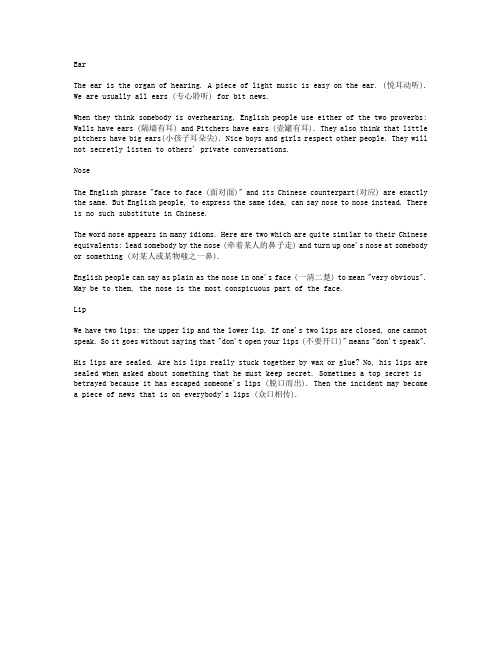
EarThe ear is the organ of hearing. A piece of light music is easy on the ear. (悦耳动听). We are usually all ears (专心聆听) for bit news.When they think somebody is overhearing, English people use either of the two proverbs: Walls have ears (隔墙有耳) and Pitchers have ears (壶罐有耳). They also think that little pitchers have big ears(小孩子耳朵尖). Nice boys and girls respect other people. They will not secretly listen to others' private conversations.NoseThe English phrase "face to face (面对面)" and its Chinese counterpart(对应) are exactly the same. But English people, to express the same idea, can say nose to nose instead. There is no such substitute in Chinese.The word nose appears in many idioms. Here are two which are quite similar to their Chinese equivalents: lead somebody by the nose (牵着某人的鼻子走) and turn up one's nose at somebody or something (对某人或某物嗤之一鼻).English people can say as plain as the nose in one's face (一清二楚) to mean "very obvious". May be to them, the nose is the most conspicuous part of the face.LipWe have two lips: the upper lip and the lower lip. If one's two lips are closed, one cannot speak. So it goes without saying that "don't open your lips (不要开口)" means "don't speak".His lips are sealed. Are his lips really stuck together by wax or glue? No, his lips are sealed when asked about something that he must keep secret. Sometimes a top secret is betrayed because it has escaped someone's lips (脱口而出). Then the incident may become a piece of news that is on everybody's lips (众口相传).。

关于身体器官的英语单词一、身体器官英语单词及短语1. head(头)- 短语:shake one's head(摇头)- 用法:通常作为名词使用,表示头部。
- 双语例句:He nodded his head in agreement.(他点头表示同意。
)2. face(脸)- 短语:make a face(做鬼脸)- 用法:名词,指脸部。
- 双语例句:She has a beautiful face.(她有一张漂亮的脸。
)3. eye(眼睛)- 短语:keep an eye on(留意,照看)- 用法:名词,眼睛。
- 双语例句:She has big blue eyes.(她有一双蓝色的大眼睛。
)4. ear(耳朵)- 短语:turn a deaf ear to(对……充耳不闻)- 用法:名词,耳朵。
- 双语例句:He listened carefully with his ear.(他用耳朵仔细听。
)5. nose(鼻子)- 短语:follow one's nose(凭直觉做事)- 用法:名词,鼻子。
- 双语例句:She has a small nose.(她有一个小鼻子。
)6. mouth(嘴)- 短语:keep one's mouth shut(保持沉默)- 用法:名词,嘴。
- 双语例句:He opened his mouth to speak.(他张开嘴说话。
)7. tongue(舌头)- 短语:on the tip of one's tongue(话到嘴边)- 用法:名词,舌头。
- 双语例句:She burned her tongue on hot coffee.(她被热咖啡烫到了舌头。
)8. tooth(牙齿)- 短语:a sweet tooth(爱吃甜食)- 用法:名词,牙齿,复数形式为teeth。
- 双语例句:She has a cavity in her tooth.(她的牙齿有个洞。
一.有关arm(胳膊)的习语1.a shot in the arm:最好的促进因素。
可引申为“使精神或自信得到恢复的东西”。
例如:I was discouraged about my chances of passing the final examination,but my teacher’s words of encouragement gave me a shot in the arm.我对于是否能通过期末考试已失去信心,可是,老师鼓励我的话使我又振作起来。
这一习语也可以按字面意思使用。
例如:The doctor gave me.a shot in the arm.医生在我胳膊上注射了一针。
2.twist someone's arm:(为使某人就范)采取强制手段。
例如:He'll do it for us.but I may have to twist his arm a bit.他会给我们干的,不过,我也许必须给他施加点压力。
3.would give one's right arm:(要是有……)该多么好,表示对难以实现的事或难到手的东西的强烈愿望。
此习语常在讲话或通俗文章使用,正式文章中一般不用。
例如:I'd give my right arm to have a car like that.我要是有那样一辆汽车该多么好。
二、有关leg(腿)的习语1.have a hollow leg:海量。
不管喝多少酒,都流进了“中空的腿”,因此,怎么也喝不醉。
例如:No more for me.thanks.I'm afraid I don’t have a hollow leg.谢谢,请别给我倒酒了,我恐怕不是海量。
2.have not(或not have).a leg to stand on:(论点等)站不住脚,完全没有根据(或道理)。
例如:Their case hasn't got a leg to stand on.他们的诉讼没有一点依据。
英语习语-身体部位类五官篇a flea in one's ear 刺耳的话bite one's tongue 隐忍不言butter wouldn't melt in one's mouth acting as if innocent;being insincere button one's lip 不说话;保守秘密cry one's eyes out 痛哭流涕cut off one's nose to spite one's face 拿自己出气down in the mouth 神色沮丧feast one's eyes 大饱眼福foam at the mouth 暴怒gift of gab 伶牙俐齿have a loose tongue 口无遮拦have a word in one's ear 悄悄的说have one's ear to the ground 注意周围的动静have one's heart in one's mouth 提心吊胆have sth coming out of ones's ear 多得不得了in one's mind's eye 在想象中;在记忆中in the twinkling of an eye 眨眼间keep a stiff upper lip 遇到困难时坚定沉着keep one's eyes skinned 保持警惕keep one's nose clean avoid getting into trouble or doing anthing illegal keep one's nose to the grindstone 埋头苦干laugh out of the other side of one's mouth 转喜为忧lend an ear to someone 聆听look down one's nose at 看不起;不放在眼里make a pig's ear of sth 把事情办砸make eyes at somebody 向某人抛媚眼music to one's ears 好消息no skin off one's nose 不好影响某人not bat an eyelid 不动声色on the nose 恰好on the tip of one's tongue 差一点说出;差一点记起pay lip service to sth 嘴上说得好听pay through the nose 付过高代价prick uo one's ears 侧耳倾听see eye to eye 意见一致shoot one's mouth off 吹嘘;to tell secretssmile ear to ear 笑得非常开心stick in one's throat 难以说出口stick one's nose in sth 管闲事;干预throw dust in one's eyes 迷惑某人tongue in cheek 无诚意地;粉刺地turn a blind eye to sth 视而不见turn a deaf ear to sth 充耳不闻up to one's ears 深陷于wet behind the ears 乳臭未干win by a nose 险胜with a jaundiced eye 有偏见的with one's nose in the air 目中无人地四肢篇be rushed off one's feet 非常忙bite the hand that feeds one 恩将仇报bring someone to heel 使某人服从burn one's fingers 管闲事或做投机买卖吃亏chance one's arm 冒险一试cool one's heels 久候cost an arm and a leg 价格极其昂贵down at heel 处境穷苦elbow grease 苦干体力活fall head over heels in love with someone 疯狂迷上某人fall upon one's feet 化险为夷feet of clay 大人物的致命弱点foot the bill 买单get one's feet wet 初次做某事;开始做某事get the lead out (of one's feet)动作迅速give someone a hand 帮助a big hand 鼓掌give someone a leg up 帮某人一把grease one's palm 贿赂某人hand in glove 密切合作;相互勾结have cold feet 胆怯have one's hands full 忙得不可开交have the upper hand 处于有利位置head and shoulders above 远远超过hit the nai on the head 正中要害hold ... at arm's length 与...保持距离keep on one's toes keep one attentive, active, busy, or alert know ... like the back of one's hand 了如指掌live from hand to mouth 仅能糊口not have a leg to stand on 站不住脚on one's last legs 垂死;疲惫不堪pull one's leg 开玩笑put one's best foot forward 快点走;全力以赴;留下好印象put one's foot in one's mouth 讲话不得体put one's shoulder to the wheel 全力以赴rap someone over the knuckles 批评某人rub shoulders with someone 与有钱人、名人接触、来往shot in the arm 刺激物show one's hand 摊牌show the cloven foot 露马脚step on one's toes 伤害某人straight from the shoulder 直截了当地说take to one's heels 跑开throw in one's hand 放弃thumb a lift 搭便车thumb one's nose 蔑视twist someone around one's little finger 控制某人twist one's arm 强迫别人做不愿做的事under one's thumb 受某人支配work one's fingers to the bone 拼命工作其他a pat on the back 表扬、赞许的话或动作a slap in the face 羞辱;让人没面子的事情all skin and bones 皮包骨的bad blood 不好的情感be glad to see the back of someone 希望摆脱某人bone up on.. 刻苦用功读书by a hair's breadth 险些...cheek by jowl with 紧紧靠着地come to a head 到关键时刻cudgel one's brains 绞尽脑汁eat one's heart out 悲痛欲绝;嫉妒feel sth in one's bones 有强烈的直觉fly in the face of 公然违抗get it in the neck 受到惩罚get one by the short hairs 使某人就范get one's own back on someone 报复get sth off one's chest 一吐为快grit one's teeth 咬牙坚持have a frog in one's throat 声音嘶哑have a hunch 有预感have egg on one's face 丢脸have one's back to the wall 处境困难have one's head in the clouds 想入非非jump down one's throat 突然动怒;严厉斥责jump out of one's skin 大吃一惊keep a straight face 摆着脸keep body and soul together 勉强糊口keep one's head above water 避免陷入困境long in tooth 上了年纪的make a clean breast of sth 忏悔;招认make no bones about sth 直言不讳make old bones 长寿make one's blood boil 使某人大发雷霆make one's blood run cold 让人胆战心惊make one's hair stand on end 让人毛骨悚然neck or nothing 孤注一掷地not turn a hair 毫不惊慌off the top of one's head 毫无准备地pain in the neck 令人讨厌的事或人save one's skin 使安然无恙set one's teeth one edge 使某人感动不舒服split hairs 钻牛角尖stab one in the back 暗算;背叛stare someone in the face 就在眼前take one's breath away 令人惊叹take the bit between one's teeth 不受控制;下定决心做某事tooth and nail 竭尽全力地touch one's forelock 毕恭毕敬turn one's back on someone 拒绝帮助;不理会turn tail 掉头逃跑until one is blue in the face 极尽努力vent one's spleen 发泄怒气。
人体部位和英语习语(二)1. StomachThe stomach is naturally related to one's appetite. If you dislike heavy food, you have no stomach for it (反胃). The word is also related to one's interests or likings. If you find something boring or vulgar, you have no stomach for it, either. Bad food turns your stomach. Similarly, your stomach turns at a bad joke.Stomach can also be a verb. Look at this example: "How could you stomach (忍受) such rude words?"Apparently, stomach here can be replaced by "tolerate".2. ArmEvery person has two arms: the right arm and the left arm. The right arm is usually stronger, so we call a good helper the right arm (得力助手).We all know an arm is not very long. But when you keep someone at arm's length (保持距离), the distance is long enough. For that means you do not like that person and you try your best to avoid him or her. We should indeed keep the bad friends at arm's length.3. HandQuite a number of phrases formed form the word hand are very similar to their Chinese counterparts. Here are some obvious examples: a fresh hand (新手), short of hands (人手短缺), hand in hand (手拉手) and wash one's hands of something (洗手不干了). But do not always take this for granted. Study these examples and you will understand.He lives from hand to mouth (He has just enough money to live on). We gave them a big hand (We gave them lots of applause.).4. FingerHow many fingers does each of your hands have? Now let's name them in English from the smallest: the little finger, the ring finger, the middle finger, the index finger and thumb.Each finger has its own part to play. If your fingers are all thumbs (笨拙), that is too bad. That means you are very clumsy.5. ThumbChinese people turn up their thumbs to express appreciation. English peopled so to express not only appreciation but also approval. Chinese people never turn their thumbs down to mean anything. But English people do.They do so to show depreciation or disapproval. Thus in English you can say, "We turn thumbs up (赞成) to Jack's suggestion but they turn thumbs down (不赞成) to it." Similarly, you can warmly praise someone by saying "Thumbs up (真棒)!" and show your dissatisfaction by saying "Thumbs down (差劲)!"6. NailIf you see two of your classmates fighting tooth and nail (又抓又咬), you must stop them at once. Otherwise, at least one of them would be hurt.Nail also means a thin pointed piece of metal for hammering into something.But it is related to the body in this sentence: "Peter is as hard as nails (结实的像铁打的)."We all hope that we are as strong and healthy as he is.Then if I say you have hit the nail on the head (中肯,一针见血), I do not mean that you have done something cruel.I mean that you have said exactly the right thing.7. LegThe word leg appears in many colloquial expressions. At a party, when you feel like dancing, you can say to a good friend of yours, "Let's shake a leg." Obviously, it means"Let's dance." When you want your fiend to hurry, you can also "shake a leg". In American English it means "hurry".The arms and legs are very important to us. Therefore when asked why you are not going to buy something expensive, you may answer, "It costs an arm and a leg!" You mean that it is really expensive. If you pull one's leg, it means you make fun of someone.8. ToeTo convey the idea "from head to foot", English people can say from top to toe. But Chinese people don't.Some people turn their toes out (八字脚) when they walk. Some turn their toes in.When faced with danger, we must be alert and ready for action, that is to say, we must be on our toes (保持警惕).9. SkinHuman beings have skin. So have animals and plants. The skin can be thick or thin. A think-skinned person, or a person who has a thin skin, is easily upset or offended while a thick-skinned person, or a person who has a thick skin, is quite the contrary. Both expressions are sometimes derogatory (贬义).That is to say, sometimes the former refers to a personwho is too sensitive; the latter a person who has little sense of shame.10. HairMost people will only think of the hair on our head when the word hair is mentioned. In fact, some animals and plants also have hair.A horrible scene may make a person's hair stand on end (毛骨悚然). But a courageous person will not turn a hair (不畏惧) even though he is in face of danger.Sometimes, a friend of yours may be so angry that he may act foolishly. Then you had better give him this advice: "Keep your hair on (别发脾气)".。
有关Head的英语习惯用语Bang/knock your/their heads together强行制止人们争吵并使之回复理智Be banging your head against a brick wall 用头撞墙;枉费心机Be/ stand head and shoulders above sth/sb 出类拔萃;鹤立鸡群Bite/ snap one’s head off(尤指毫无理由地)呵斥某人Bring sth to a head/ come to a head(使)事情到达紧要关头,需要当机立断Bury/hide your head in the sand采取鸵鸟政策;不正视现实;回避问题Can’t get a head round sth不理解某事;不明白某事Can’t make a head nor tail of sth不能理解某事;茫无头绪Do sb’s head in使某人困惑(或烦恼,生气)Do sth standing on your head做某事不费吹灰之力From head to foot/toe从头到脚;遍布全身Get your head down避免引起注意;保持低姿态Give sb their head让某人随心所欲Go head to head( with sb)(与某人)面对面直接谈判Go to your head使人过于骄傲;冲昏头脑Have a good head on your shoulders头脑清醒;明智Have your head screwed on( the right way) 头脑清醒,理智Have your head in the clouds心不在焉;走神Hold your head high/hold up your head昂首挺胸;抬起头来Have a head for sth长于算数;有生意头脑Head over heels in love深深爱着某人;迷恋Heads or tails?(掷硬币作决定时说)正面还是反面In over your head卷入棘手的事Keep your head/keep a clear/cool head (在困境中)保持冷静Keep your head above water勉强逃脱困境;设法不举债;Laugh/scream your head off大笑或大叫Lose your head失去理智;慌乱;昏了头On your(own)be it你(自己)必须自己承担后果Out of your head行为乖张;神志不清;胡言乱语Over sb’s head超过某人理解力;过于复杂Put your/ our/their heads together集思广益Stand/turn sth on its head使人完全改变思路;使人从反面思考Take it into your head to do sth忽发奇想;心血来潮Turn sb’s head(of success, praise, etc):to make a person feel too proud in a way that other people find annoying)使某人得意忘形Take it into your head that……突然开始想某事Be heading for sth1)很可能遭受(不幸);会招致2)朝……方向(或地方)行进;前往Head sb off阻拦某人;是改变方向Head sth off阻止,防止某事发生Run around like a headless chicken无头绪的瞎忙一通Grab/hit/make the headlines成为重要新闻有关eye的英语习语Be up to your eyes in sth忙于;深陷于;An eye for an eye以牙还牙For sb’s eye only只供某人读或看Have an eye for sth对……有鉴赏力Have an eye on sth做另一件事得同时(悄悄)注意Have eyes in your back of your head脑后长眼;眼光敏锐Have you eye on sb1)密切关注;盯住;监视2)看中,看上In the eye of the law /world从法律世人的观点看Keep an eye on sb/sth留神照看Look sb in the eye/face(坦然或问心无愧地)直视某人Not see eye to eye with sb(on sth)与某人看法不一致;与……不敢苟同Not( be able to) take your eyes off sb/sthShut your eyes to sth对……熟视无睹;With an eye to sth/to doing sth着眼于;目的在于Have eyes only for sb只钟情于某人See/look at sth through sb’s eyes站在别人的立场上思考问题;从别人的观点看待某事With your eyes open明知有问题With your eyes closed/shut轻而易举;毫不费力Eyeball to eyeball (with sb)怒目相视;对峙;与……剑拔弩张Eye sb up色迷迷地打量某人Have /get an eyeful(of sth)一饱眼福;好好看一看Give your eye teeth for sth/to do sth迫切想要有关nose 的习惯用语Cut off your nose to spite your face 伤人害己,Have you nose in sth专心致志地(读书)Keep your nose clean循规蹈矩;不作为法的事Keep your nose out of sth避免插手(他人的事)Keep your nose to the grindstone 连续辛勤地工作Look down your nose at sth/sb蔑视;对……不屑一顾Stick/pork your nose into sth多管闲事Put sb’s nose out of joint使难堪;惹恼Turn your nose up at sth拒绝;看不上;看不起With your nose in the air自高自大;傲慢;看不起人。